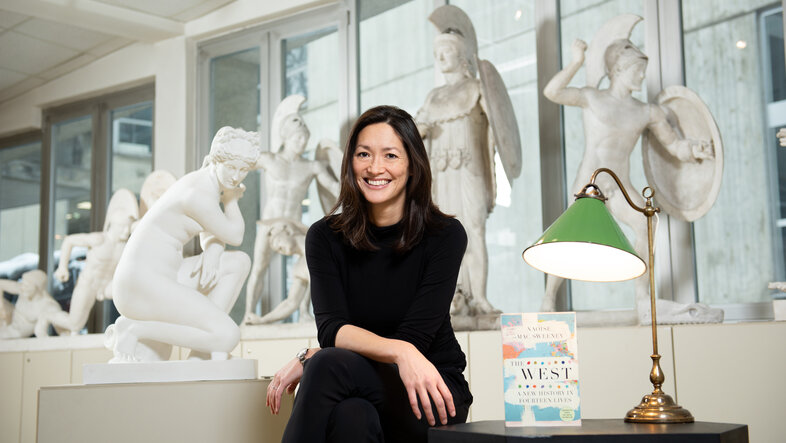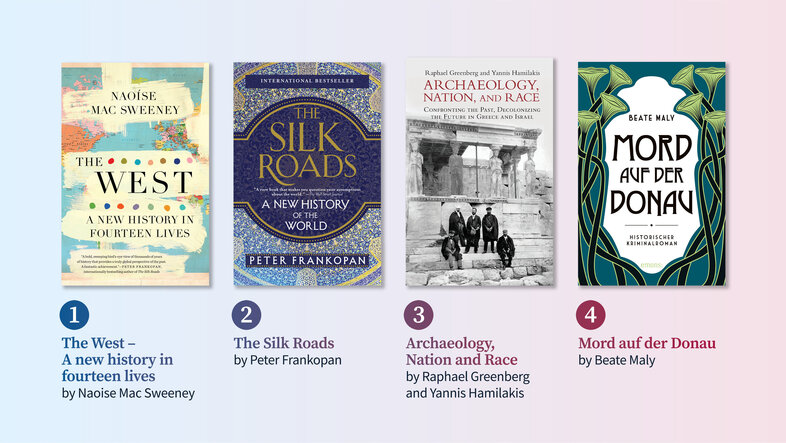Reading "The West" with Naoíse Mac Sweeney
Rudolphina: What is your book about and why did you write it?
Naoíse Mac Sweeney: The West is about the invention of Western civilization as an idea. What I mean by that is the concept that the modern West has a very particular history - a history that rolls back in time through the European enlightenment, the Renaissance, the medieval period and ultimately has its origins in ancient Rome and ancient Greece. So, there is this story of the "history of the West" – this vision that we call Western civilisation. The book aims to question this story and to argue that the story is an invention. And to actually pin down the dates at which the story was invented, identifying the period between the 16th and the 18th century.
My research focuses on the classical Greek world, which holds a political and cultural value for us today. The whole idea of the ancient Greek world as the ancestor of the modern West is an idea that is deeply political. And this is something I did not realise when I first set out to study classical archaeology and ancient Greece. But as a more mature researcher, I began to realise this more and more. And so I am complicit in narratives of Western identity and I realised that I was not entirely comfortable with that. Therefore, I started to delve into the issue a little further, which was also a bit of a journey of understanding myself, what my profession means and where it stands in relation to contemporary society. This was a central motivation for writing this book.
Rudolphina: Who should read your book and why?
Naoíse Mac Sweeney: I am hoping to reach two audiences with this book. On the one hand, people who are generally interested in the big themes of history. People who are into large-scale history books covering a broad period of time. On the other hand, the book is targeted at people who are interested in questioning Western identity and who are thinking about the situation that the West finds itself in today with its identity crisis. I hope my readers will find something in my book that speaks to them and inspires them to think in different ways.
Rudolphina: Is there any other book you would recommend to readers who have enjoyed The West?
Naoíse Mac Sweeney: I think an important book for further reading is The Silk Roads by Peter Frankopan. It also covers a wide span of history from antiquity until almost the modern day. It explores the interconnections between Europe and Asia along the Silk Roads and discusses what made this Eurasian interaction so very successful. The book shows how our notions of the West and our notions of the East were never completely separate. So, I think that this is an excellent addition to my book, because what Frankopan does is explain the reality of human interconnectivity throughout time. What I have been trying to do is to explain why – despite this reality – we are faced with imagined barriers. So in a way, I think that Frankopan's book had to happen before my book happened.
The whole idea of the ancient Greek world as the ancestor of the modern West is an idea that is deeply political.Naoíse Mac Sweeney
Rudolphina: What other book can you recommend to dig even deeper?
Naoíse Mac Sweeney: I picked Archaeology, Nation and Race by Raphael Greenberg and Yannis Hamilakis. This is a very recent book. It focuses on the way that the ancient past has been used and manipulated in modern historical narratives and for modern political purposes. And it focuses very specifically on archaeology and archaeological practices. So it directly resonates with me as a classical archaeologist. I think it is one of a series of books written by archaeologists who are now becoming a bit more aware of the political implications of the work we are doing. We are not merely sitting in our universities and on our excavations, only doing pure science. Actually, the texts we write have societal implications. And as a discipline, we are increasingly coming to terms with that now. This book is a stimulating, provocative read. I do not agree with everything they say, but I think we need provocative books that force us to think differently or question the lazy assumptions that we might have.
Rudolphina: What book is currently on your bedside table?
Naoíse Mac Sweeney: Something completely different. I have been trying to improve my German and learn more about Austria, its culture and its traditions. So, I picked up Mord auf der Donau by Beate Maly, a historical crime novel. It is kind of a silly book, but I do love a quirky crime novel from time to time. And I really like the lead character, a retired Latin teacher.
Rudolphina: What a perfect fit!
Naoíse Mac Sweeney: She is a woman called Ernestine Kirsch who solves the crimes in Maly's novels. Maybe one day in the future when I have retired, I will be solving crimes as well.
About the book
The West - A new history in fourteen lives
By Naoíse Mac Sweeney, WH Allen (UK) and Dutton (US), 438 p.
In this groundbreaking, story-driven retelling of Western history, Naoíse Mac Sweeney debunks the myths and origin stories that underpin the history we thought we knew. Told through fourteen figures who each played a role in the creation of the Western idea—from Herodotus, a mixed-race migrant, to Phylis Wheatley, an enslaved African American who became a literary sensation; and from Gladstone, with a private passion for epic poetry, to the medieval Arab scholar Al-Kindi—the subjects are a mind-expanding blend of unsung heroes and familiar faces viewed afresh. (Publisher's press release)
She is leading the ERC-funded project MIMAG: Migration and the Making of the Ancient Greek World. Before joining the University of Vienna in 2020, she was a lecturer at the University of Leicester and she holds a PhD from the University of Cambridge. Her book, Troy: Myth, City, Icon was shortlisted for a PROSE award of the Association of American Publishers."The West" was the BBC Radio 4 Book of the Week.

